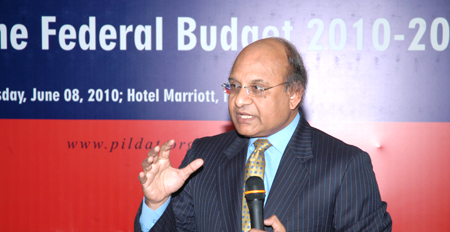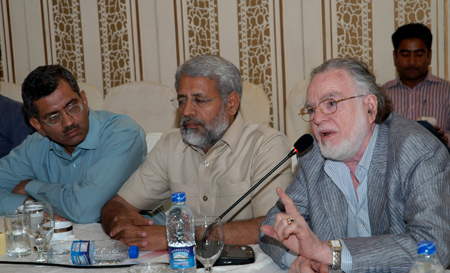|
|
| |
| EVENTS |
|
|
> PILDAT holds Exclusive Briefing for Parliamentarians on Analysis of the Federal Budget 2010-2011
|
| |
|
Briefing on Budget
June 08, 2010
Islamabad
|
|
| |
Islamabad, June 08: PILDAT held an exclusive briefing for Parliamentarians on Analysis of the Federal Budget 2010-2011 here today. Dr. Ashfaque H. Khan, Dean & Professor, National University of Science and Technology (NUST) Business School, Islamabad presented the budget analysis and answered questions of a diverse group of MPs belonging to different political parties and provinces. |
|
| |
The objective behind PILDAT briefing was to provide Parliamentarians with a concise, succinct and objective overview of the Budget 2010-2011 to assist them in understanding the budget and to make the budget debate and budget scrutiny by Parliament more meaningful.
|
|
| |
Speaking to Parliamentarians belonging to different political parties, Dr. Ashfaque H. Khan said that this budget can be termed as stabilization Budget with human face and reform agenda where revenue target is ambitious but achievable. He said that economic team of Ministry of Finance and Economic Affairs would require constant support of provincial governments and Prime Minister in achieving federal budget targets. He said that best relief to poor can only be provided through reduction in inflation and not subsidies. |
|
| |
Defining the Budget, Dr. Khan said that budget is not only an account of revenue and expenditure of the Government but it is also a policy instrument (Fiscal Policy) to address economic challenges, which has been prepared in the background of domestic and external economic challenges. Our domestic economic challenges are declining investment in the country that slows the economic growth and, eventually, raising the unemployment as well as poverty. Other domestic economic challenges, according to him, are double-digit inflation, mounting debt burden, depreciating exchange rate, large budget deficit, poor and mismanaged public sector enterprises (PSEs), power shortages/mismanagement and, last but not least, waning confidence of the private sector. Our external economic environment affects by World economy as emerging from worst recession since the World War II, where recovery is still fragile and recent debt crisis of Greek, Spain, Portugal and other Euro zone countries have enhanced risks to the Global Economy. |
|
| |
Dr. Ashfaque H. Khan said that Provinces are receiving more Resources than Federal Government for the first time, which means additional money to the provinces on Health, Education, Law and Order, Drinking Water and Municipal Services that, correspondingly, lessen the fiscal space for the federal government and accordingly fewer resources for social sectors. As this Budget is prepared in the framework of international commitments, the responsibility has now been shifted to the provincial Governments. |
|
| |
Highlighting the objectives of the Federal Budget 2010-2011, Dr. Khan said that this budget is prepared to protect the economic recovery, to reduce the budget and current account deficits, reducing inflation, bringing debt situation under control, protecting the poor and fixed income group, reforming public sector enterprises (PSEs), employment generation, making Pakistan attractive for foreign investment and energy and food security. |
|
| |
Explaining how the federal Budget is going to achieve the objectives, Dr. Khan said in order to restore macroeconomic stability, the budget deficit is targeted at 4% of GDP � down from 5.1% in 45%9-10, which may reduce the borrowing requirements of the Government that means private sector will get more credit and ease pressure on interest rate. State Bank of Pakistan may be able to reduce discount rate that may lead to decline the capital cost and that may encourage private sector to invest more, thus investment may rise. Also, economic recovery may gain momentum and may create employment opportunities, and will help to reduce inflation in the country. |
|
| |
Elaborating the salient features of the federal Budget 2010-2011, Dr. Khan said that the total outlay of budget 2010-11 is Rs. 2764 billion which is 12.3% higher than the size of budget estimates 2009-10. He said the net revenue receipts for 2010-11 have been estimated at Rs. 1377 billion indicating an increase of 1.9% over the budget estimates of 2009-10. He added that provincial share in federal revenue receipts is estimated at Rs. 1034 billion during 2010-11 which is 57.9% higher than the budget estimates for 2009-10 and the capital receipts (net) for 2010-11 have been estimated at Rs. 325 billion against the budget estimates of Rs. 191 billion in 2009-10 i.e. an increase of 70.2%. External receipts in 2010-11 are estimated at Rs. 387 billion, which shows a decrease of 24% over the budget estimates for 2009-10. According to him the overall expenditure during 2010-11 has been estimated at Rs. 2764 billion of which the current expenditure is Rs. 1998 billion, showing a decline of 1% over the revised estimates of 2009-10. The share of current expenditure in total budgetary outlay for 2010-11 is 72% as compared to 78% in revised estimates for 2009-10. |
|
| |
Talking about how the Federal Budget 2010-2011 protects the poor and the fixed income groups, Dr. Ashfaque H. Khan said that relief to poor has been given by the budget such as allocation to the Benazir Income Support Programme (BISP) raised to Rs. 50 billion that will benefit 5 million poor households through out country, under the exit strategy from BISP, one family member of the recipient family to be provided necessary skills to get gainful employment. Training to be provided to about half a million people, which will be doubled in subsequent years, minimum wage for workers increased from Rs. 6,000 to Rs. 7,000, pilot program for provision of 100 days of guaranteed employment to rural unskilled laborers to be launched in 120 union councils of 12 districts which are least developed and suffered with conflict / insurgency and relief from bait-ul-maal to continue for which an allocation of Rs. 2.16 billion has been made. The government is giving ownership to workers in state-owned enterprises (SOEs) under Benazir Employees Stock Option Scheme that 12% shares have been given to the workers in SOEs. And National Internship Program for young unemployed post-graduate for a period of one year will continue with a monthly stipend of Rs. 10,000 is being paid. More than 27,000 interns have benefited last year and more will benefit in 2010-11 for which an allocation of Rs. 3.6 billion has been made.
Whereas relief for the fixed income group is concerned, salary of the government servants raised by 50%; medical allowance for BPS 1 � 15 doubled, medical allowance for BPS 16 � 22 raised by 15%, an increase in pension by 20%, those retired before 2001, increase in pension by 15%, those retired after 2001, minimum pension raised from Rs. 2,000 to Rs. 3,000, rate of family pension up from 50% to 75%, night duty allowance for assistants / clerks raised from Rs. 10 per night to Rs. 40 per night, same allowance for driver and naib qasid raised from Rs. 5 to Rs. 25 per night, conveyance allowance for late sitting raised to Rs. 50 per day for BPS 1 � 16, special pay to stenographers and steno typists doubled and daily allowance on outstation duties raised by 50% - 100% for BPS 1 � 16.
Dr. Ashfaque H. Khan said Budget depicts that through energy conservation programme, the government has saved nearly 1,000 MW of electricity which has brought some relief to domestic consumers whereas diversion of natural gas to power plants to improve their efficiency is also included. He added that free distribution of 30 million energy savers is also included in the budget and an energy development fund is being established in consultation with Asian Development Bank (ADB) with seed money of Rs. 20 billion. He said an allocation of Rs. 131 billion is made in budget 2010-11 for hydel, thermal, and nuclear energy projects to augment generation and improve transmission.
There is also emphasis on development of agriculture and water resources in the Budget as well. Raising of Mangla Dam, Gomal Zum Dam, and Satpara Dam would be completed in 2010 � 11, which will substantially add to the availability of water, whereas Diamir � Bhasha Dam will be launched as a mega project in 2010-11 which would generate 4,500 MW electricity and store 6,450 MAF water. For attaining food security, the combined budgeted allocation in development budget 2010-11 for water, food, and agriculture, live-stock and dairy development sectors is in excess of Rs. 40 billion.
Highlighting the risks to the Federal Budget 2010-2011, Dr. Khan said it depends on how smoothly transition from General Sales Tax (GST) to Value Added Tax (VAT) takes place on October 01, 2010. Federal Board of Revenue (FBR) target for 2010-11 appears ambitious; the FBR may collect Rs. 1,325 billion in 2009-10, assuming a growth rate of 14.5%, the autonomous increase in revenue would be Rs. 1,517 billion, additional revenue through tax measures may fetch another Rs. 50 � 60 billion, thus total tax collection of FBR may stand at Rs. 1,567 � 1,577 billion in 2010-11, slippages may occur in current expenditures and if provinces do not generate surplus to the extent of Rs. 167 billion, or 1% of GDP, the overall fiscal deficit may reach 5% of GDP. Also, under the new NFC award, bulk of resources will be transferred to provinces with greater responsibilities � a positive development. However, there is a fear that the infrastructure in provinces to absorb these massive resources may not be enough.
Concluding the exclusive briefing session for Parliamentarian, Mr. Ahmed Bilal Mehboob, Executive Director of PILDAT thanked the speaker, Dr. Ashfaque H. Khan and the participants of the exclusive briefing session, which was attended by a large number of Parliamentarians, civil society and media representatives.
This exclusive briefing was organized by PILDAT as a part of the Parliamentary and Political Party Strengthening Project which is funded through Canada's Department of Foreign Affairs and International Trade (DFAIT). The project is implemented jointly by the Parliamentary Centre, Canada and PILDAT. |
|
| |
|
|
| |

|
|
| |
|
|
| |

|
|
|
|
|
|
|
|
|